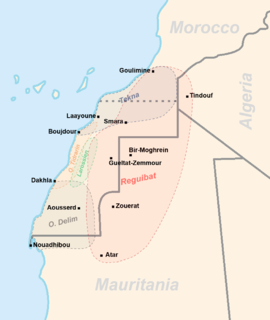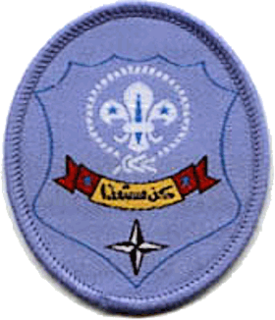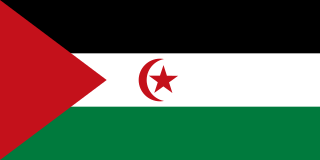
Western Sahara is a disputed territory on the northwest coast and in the Maghreb region of North and West Africa, partially controlled by the self-proclaimed Sahrawi Arab Democratic Republic and partially occupied by neighboring Morocco. Its surface area amounts to 266,000 square kilometres (103,000 sq mi). It is one of the most sparsely populated territories in the world, mainly consisting of desert flatlands. The population is estimated at just over 500,000, of which nearly 40% live in Laayoune, the largest city in Western Sahara.
The history of Western Sahara can be traced back to the times of Carthaginian explorer Hanno the Navigator in the 5th century BC. Though few historical records are left from that period, Western Sahara's modern history has its roots linked to some nomadic groups such as the Sanhaja group, and the introduction of Islam and the Arabic language at the end of the 8th century AD.
Hassan, Hasan, Hassane, Haasana, Hassaan, Asan, Hassun, Hasun, Hassen, Hasson or Hasani may refer to:

Laâyoune or El Aaiún is the largest city of the disputed territory of Western Sahara and de facto administered by Morocco. The modern city is thought to have been founded by the Spanish colonizer Antonio de Oro in 1938. In 1940, Spain designated it as the capital of the Spanish Sahara. Laâyoune is the capital of the Laâyoune-Sakia El Hamra region administered by Morocco under the supervision of the UN peace-keeping mission in Western Sahara (MINURSO).
A zaouia or zawiya is an Islamic religious school or monastery. The term is Maghrebi and West African, roughly corresponding to the Eastern term madrasa. A zawiya often contains a pool, and sometimes a fountain.

The Sahrawi, or Saharawi people, are the people living in the western part of the Sahara desert which includes Western Sahara, southern Morocco, much of Mauritania and the extreme southwest of Algeria.
The place names of the Maghreb come from a variety of origins, mostly Arabic and Berber, but including a few derived from Phoenician, Latin, and several other languages. This is well illustrated by the three largest cities of Algeria, for instance: Algiers from Arabic al-jazā'ir "the islands", Oran from wahran from Berber wa-iharan "place of lions" and Constantine from the Latin name of the emperor Constantine. Phoenician names include Jijel, shortened from Latin Igilgili, from Phoenician i gilgilt "Skull Island", and Carthage, ultimately from Punic qrt-ḥdšt "New City."
The Baggāra are a grouping of Arab ethnic groups inhabiting the portion of Africa's Sahel mainly between Lake Chad and southern Kordofan, numbering over six million. They are known as Baggara in Sudan, and as Shuwa/Diffa Arabs in Chad and Nigeria. Their name derives from the Arabic word literally meaning "cattle herder".
The people of Western Sahara speak the Ḥassānīya dialect of Arabic, also spoken in northern Mauritania, and Spanish. They are of mixed Arab-Berber descent, but many consider themselves Arab. They claim that they descend from the Beni Hassan, an Arab tribe, who invaded the Western Saharan desert in the 14th century. The Sahrawis are Muslims of the Sunni sect and the Maliki law school. Their interpretation of Islam has traditionally being quite liberal and adapted to nomad life.

Scouting exists in Western Sahara both as part of the Fédération Nationale du Scoutisme Marocain as well as independent groups.

The Royal Advisory Council for Saharan Affairs is an advisory committee to the Moroccan government on the Western Sahara. It was devised by King of Morocco, Hassan II in the 1970s, but allowed to lapse. It was re-established by his son, Mohammed VI in early 2006, after a new autonomy plan was devised to replace the United Nations' Baker Plan. The autonomy plan is opposed by the Polisario Front, which demands that the United Nations resolutions calling for a referendum be implemented.
The people of the Maghreb and the Sahara speak various dialects of Berber and Arabic and almost exclusively follow Islam. The Arabic and Berber groups of languages are distantly related, both being members of the Afro-Asiatic family. The Sahara dialects are notably more conservative than those of coastal cities. Over the years, Berber peoples have been influenced by other cultures with which they came in contact: Nubians, Greeks, Phoenicians, Egyptians, Romans, Vandals, Arabs, and lately Europeans. The cultures of the Maghreb and the Sahara therefore combine indigenous Berber, Arab and elements from neighboring parts of Africa and beyond. In the Sahara, the distinction between sedentary oasis inhabitants and nomadic Bedouin and Tuareg is particularly marked.
The Hassane is a name for the traditionally dominant warrior tribes of the Sahrawi-Moorish areas of present-day Mauritania, southern Morocco and Western Sahara. Although lines were blurred by intermarriage and tribal re-affiliation, the Hassane were considered descendants of the Arab Maqil tribe Beni Hassan. They held power over Sanhadja Berber-descended zawiya (religious) and znaga (servant) tribes, extracting from these the horma tax in exchange for armed protection.

Morocco – sovereign country located in western North Africa. Morocco has a coast on the Atlantic Ocean that reaches past the Strait of Gibraltar into the Mediterranean Sea. Morocco has international borders with Algeria to the east, Spain to the north, and a disputed border with Mauritania to the south.

Sahrawi nationality law is the law of the Sahrawi Arab Democratic Republic (SADR) governing nationality and citizenship. SADR is a partially recognized state which claims sovereignty over the entire territory of Western Sahara, but only administers part of that territory.

Precolonial Mauritania, lying next to the Atlantic coast at the western edge of the Sahara Desert, received and assimilated into its complex society many waves of Saharan migrants and conquerors.
Awlad Himayd is a group of people who are part of the greater Baggara Arabs fraternity of Kordofan and Darfur that includes the Habbaniya and Ta'isha.

Mariem Hassan was a Sahrawi singer and lyricist from Western Sahara. She usually sang in Hassaniyya, an Arabic dialect spoken mostly in Western Sahara and Mauritania, and occasionally in Spanish. Her use of the Spanish language was related to the former status of Western Sahara as a Spanish colony.

The Sahrawi Arab Democratic Republic is a partially recognized de facto sovereign state located in the western Maghreb, which claims the non-self-governing territory of Western Sahara, but controls only the easternmost one-fifth of that territory. Until 1976, Western Sahara was known as Spanish Sahara, a Spanish colony.

The Awlad Sidi Shaykh was a confederation of Arab tribes in the west and south of Algeria led by the descendants of the Sufi saint Sidi Shaykh. The Awlad had religious authority, and also owned agricultural settlements and engaged in trade. During the French occupation of Algeria they alternately cooperated with and opposed the colonialists.










